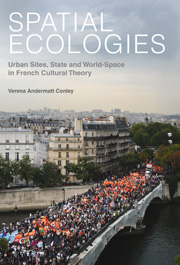Book contents
- Frontmatter
- Contents
- Introduction: Space as a Critical Concept
- 1 Henri Lefebvre: Lived Spaces
- 2 Michel de Certeau: Anthropological Spaces
- 3 Jean Baudrillard: Media Places
- 4 Marc Augé: Non-Places
- 5 Paul Virilio: Speed Space
- 6 Deleuze and Guattari: Space and Becoming
- 7 Bruno Latour: Common Spaces
- 8 Etienne Balibar: Spatial Fictions
- Conclusion: Future Spaces
- Bibliography
- Index
Introduction: Space as a Critical Concept
- Frontmatter
- Contents
- Introduction: Space as a Critical Concept
- 1 Henri Lefebvre: Lived Spaces
- 2 Michel de Certeau: Anthropological Spaces
- 3 Jean Baudrillard: Media Places
- 4 Marc Augé: Non-Places
- 5 Paul Virilio: Speed Space
- 6 Deleuze and Guattari: Space and Becoming
- 7 Bruno Latour: Common Spaces
- 8 Etienne Balibar: Spatial Fictions
- Conclusion: Future Spaces
- Bibliography
- Index
Summary
This book moves along the wide arc of the “spatial turn” that critical thinking has taken over the last thirty years. It follows this trajectory in order to see how and where space, something that defies reduction to a simple or stable definition, can now be appreciated for its ecological implications. The principal argument that follows is that, to varying degrees, philosophers born of or nurtured by the ferment of “May 1968” build their work over a spatial crisis that has since broadened to include consideration of the well-being of the planet. When critics and writers take a spatial turn they move from traditionally restricted fields of study, their disciplines as it were, to see where their work stands in view of globalization. The spatial turn now curves toward an ethics of living and working collectively on a planet whose habitability seems to be problematic and whose resources are today less abundant than they had been three decades ago.
Before all else it must be asked: might a prodigiously accumulating critical mass of writing on space be a symptom of a diminishing return? Would the increasing number of reflections on the nature of space betray a sense of its attrition? The questions are posed to underscore the paradox motivating much of what follows. While the space our globe allots to us can seem oddly infinite in its finite measure, our worst fears tell us that it is vanishing.
- Type
- Chapter
- Information
- Spatial EcologiesUrban Sites, State and World-Space in French Cultural Theory, pp. 1 - 10Publisher: Liverpool University PressPrint publication year: 2012



